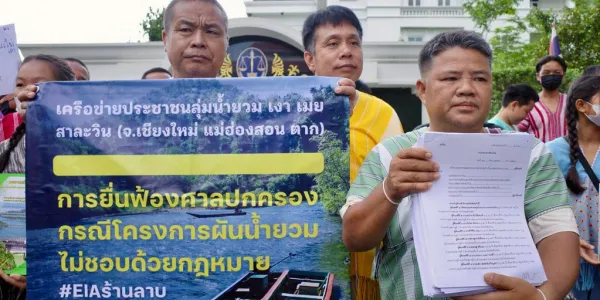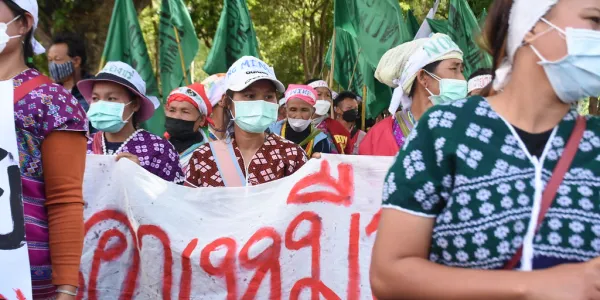By Prachatai |
Community networks in the Northern Thailand have filed a lawsuit requesting the cancellation of the Yuam River diversion project and a revocation of project’s EIA approval on the grounds that it was conducted without public participation.
By Prachatai |
<p>50 residents of Kaboedin village, Omkoi district, Chiang Mai, filed a lawsuit with the Chiang Mai Administrative Court on Monday (4 April) to revoke an environmental impact assessment (EIA) for a coal mine project sited near their community.</p>
<div>A grassroot network last week blasted the government’s environmental bill, saying that it is aimed at helping investors rush through the environmental impact assessment process at the cost of the environment. They also vowed to propose a people’s version of the law. </div>
<div> </div>
<div>The People’s Network for Sustainable Development on 7 December 2017 gathered in front of the Office of the Public Sector Development Commission (OPDC) near Government House to protest against the Enhancement and Conservation of the National Environmental Quality Bill.
</div>
<p>Civil society groups have vowed to gather in front of Government House next month if the junta passes a new environmental law.</p><p>On 14 November 2017, representatives of People’s Network for Sustainable Development gathered at the Office of the Public Sector Development Commission in Bangkok.</p><p>They demanded a halt to the bill to revise the Enhancement and Conservation of National Environmental Quality Act of 1992.</p>
<p dir="ltr">The military has summoned the leader of an environmental group opposing China’s exploration of the Mekong River for the purposes of developing a commercial shipping route. </p>
<p>On 25 April 2017, Col Jarat Panyadi, Deputy Commander of the 37 Military Circle of Chiang Rai, <a href="http://www.tlhr2014.com/th/?p=4107">summoned </a>Niwat Roikaew, the leader of an a local environmental conservation group called ‘Khon Rak Chiang Kong’, for a “chat” at a coffee shop.</p>
<div>
<div>More than 500 villagers in northeastern Thailand have gathered to oppose a potash mine, saying the mine operator bypassed the Environmental Impact Assessment process. </div>
<div> </div>
<div>On 25 September 2016, over 500 villagers from Wanon Niwat District, Sakon Nakhon Province, gathered at the District Office to oppose a local potash mining project.
</div></div>
<p>The cabinet under Gen Prayut Chan-o-cha, the junta leader and Prime Minister, has given the green light to a proposal to shorten the EIA process by half to speed up mega construction projects.</p>
<p>According to the <a href="http://www.tnamcot.com/content/322508">Thai News Agency</a>, Deputy Prime Minister Somkid Jatusripitak, the junta’s chief economic advisor, said on Tuesday, 3 November 2015, that the cabinet has approved a plan to cut short the process of conducting Environmental Assessment Impacts (EIA) on PPP (Public and Private Partnership) mega projects.</p>
<p>An environment conservation group in Isan, Northern Thailand, has requested the court to halt petroleum drilling. </p>
<p>About 30 village activists opposing drilling in a potential petroleum field called Dongmoon located in Kranuan District of the northeastern province of Khon Kaen at the border with Kalasin Province on Tuesday, 6 October 2015, requested Khon Kaen Provincial Administrative Court to hold an emergency hearing to halt the drilling operation.</p>
<p>People in the western provinces of Thailand are urging the authorities to halt a project to build a motorway connecting the outskirts of Bangkok to the western coast, because of environmental concerns about the Mae Klong River Basin.</p>
By Mekong Partnership for the Environment |
<div>HANOI, May 14, 2015 – In a ground-breaking agreement, government officials and civil society representatives from across the Mekong region established a working group to develop a regional public participation guideline for Environmental Impact Assessment (EIA) this week in Hanoi, Vietnam. </div>
<div> </div>
<div>The Mekong Regional Technical Working Group for EIA brings together governments, civil society organizations (CSOs), and will expand to cover private sector and EIA experts to improve regional cooperation for effective EIA policy and practices.
</div>
<p>Military and police officers came to inspect a seminar about environmental impacts on a disputed oil field in Isan, Thailand’s Northeast. </p>
<p>According to <a href="https://www.facebook.com/lawyercenter2014/posts/826426717407184">Thai Lawyers for Human Rights (TLHR)</a>, about 30 military from Internal Security Operations Command (ISOC) and police officers in plainclothes and in uniforms on Tuesday morning came to monitor a public seminar titled ‘EIA (Environmental Impact Assessment) Na Moon: the Injustice of Land Based Petroleum in Isan’</p>
<p>The authorities continue to suppress local activists and villagers who oppose petroleum exploration in villages in Thailand’s Northeast.</p>
<p>According to <a href="https://www.facebook.com/lawyercenter2014/posts/800328040017052?fref=nf">Thai Lawyers for Human Rights (TLHR)</a>, the military on 25 February brought Thawatchai Surat, a northeastern energy activist, to Buriram Muang Police Station and tried to force him to sign an agreement not to campaign against a petroleum operator. However, Thawatchai refused to sign any document. </p>


